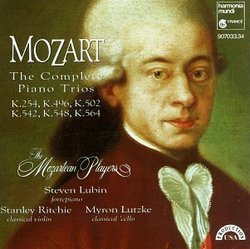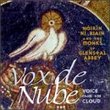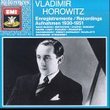| All Artists: Wolfgang Amadeus Mozart, Steven Lubin, Stanley Ritchie, Myron Lutzke Title: Mozart: The Complete Piano Trios (K.254, K.496, K.502, K.542, K.548, K.564) - The Mozartean Players Members Wishing: 0 Total Copies: 0 Label: Harmonia Mundi France Release Date: 12/7/1992 Album Type: Import Genre: Classical Styles: Chamber Music, Historical Periods, Classical (c.1770-1830) Number of Discs: 2 SwapaCD Credits: 2 UPC: 093046703325 |
Search - Wolfgang Amadeus Mozart, Steven Lubin, Stanley Ritchie :: Mozart: The Complete Piano Trios (K.254, K.496, K.502, K.542, K.548, K.564) - The Mozartean Players
 | Wolfgang Amadeus Mozart, Steven Lubin, Stanley Ritchie Mozart: The Complete Piano Trios (K.254, K.496, K.502, K.542, K.548, K.564) - The Mozartean Players Genre: Classical
Mozart did not confide his most profound thoughts to the trio medium. These pieces aren't superficial, but they aren't his most demanding or intense chamber works either. For that reason, they may be the wrong choice for c... more » |
Larger Image |
CD DetailsSynopsis
Amazon.com Mozart did not confide his most profound thoughts to the trio medium. These pieces aren't superficial, but they aren't his most demanding or intense chamber works either. For that reason, they may be the wrong choice for continuous listening sessions; one at a time is usually best. If you want to hear the music, however, here is an ideal way. Steven Lubin's rippling fortepiano leads the ensemble, but never at the expense of the other parts. The players never exaggerate Mozart's little spells of mock-tragedy, and their alertness keeps the music lively and involving. In performance and recording this is a near-ideal set. --Leslie Gerber Similar CDs
Similarly Requested CDs
|
CD ReviewsBeautiful recording - perfectly in the spirit of the music e j powell | Hong Kong | 10/10/2001 (5 out of 5 stars) "I am embarrassed to say that I have come to Mozart's piano trios only lately. I very much enjoyed the recordings by the highly respected Beaux Arts Trio and the recent DG recording by the exemplary Pires, Dumay and Wang. I was suspicious of this version - I tend not to like the sound of the Fortepiano, and have disliked the recordings I've heard by Lubin, despite the high estimate of them in the music press. but i love the trios so very much that I took a risk and bought the set. I have rarely been so delighted - the sound of the fortepiano is not at all strange or 'out-of-tune sounding.' On the contrary, it is gentle, refined - in short - just right. But what is so appealing about this recording is the sheer 'rightness' of the interpretations - the tempos, the interplay between the players, the stylishness, grace and sheer beauty of the interpretations. There is wit, irony and also a darker side which the players bring out with effortless grace. These recordings are so 'right' that it is now impossible for me to go back to pires on her modern grand piano (too grand and Romantic) or even the beloved Beaux Arts Trio (somehow dated and up-tight). this is THE one to go for. But don't take my word for it - just try the first movement of the Divertimento - doesn't it do the trick for you too? I do hope so. Warmly and affectionately recommended." THE recording to get of these trios e j powell | 04/23/2003 (5 out of 5 stars) "I heartily agree with the reviewer from Scotland/Hong Kong (although I would encourage him/her to give the other Lubin recordings a chance too)! The world-renowned Beaux Arts Trio has been one of my favorites for years and years, and their recording of these Mozart trios used to be my favorite. That was until I heard this recording by the Mozartean Players on period instruments -- it just strikes the perfect balance. It's tricky when playing Mozart not to get carried away by his sheer brilliance, but this recording shows so many more subtleties while still allowing that brilliance to show through." The Genius of Mozart Todd Ebert | Long Beach California | 12/25/2002 (5 out of 5 stars) "This music was written and performed with such succintness, exactitude, beauty, and perfection, that it made me realize how such virtues can exist in music and transfer to the life of the listener. The more I listen to this double cd, which was the first classical cd I had ever purchased, the more I ponder how different the world would seem if the average individual gravitated back toward Mozart, and away from media-hyped music.
The idea seems quite simple: forte piano (played wonderfully by Steve Lubin), cello, and violin directed by Mozart's compositional vision, and lifting the listener's mind and spirit with these aforementioned virtues; taking both to new heights. As a younger music listener I would often get caught in the hooks that are thrown in to sell records. This recording has no such hooks, as it seems like one continuous meditation on what music can offer the human condition. I know "genius" has been used to describe millions of people in the past, but if I had to limit this label to twenty individuals in world history, I believe an argument could be made that Mozart would fall in that elite group. And not pursuing his music as a listener is like settling for an alchemical view of the world in light of the most advanced science." |

 Track Listings (9) - Disc #1
Track Listings (9) - Disc #1






